 McCain wins in crucial US primary
John McCain has won the Republican presidential primary with a
substantial lead, US media have said.
Former Massachusetts governor Mitt Romney came second and conceded
defeat. For the Democrats, Hillary Clinton is leading Barack Obama, the
winner of last week's Iowa caucuses, by 39% to 37%, with 57% of the
votes counted.
The state secretary, Bill Gardner, has estimated that the turnout in
the vote could break records, with some half a million people having
cast ballots. Candidates are aiming to build momentum before more than
20 states hold polls on 5 February, known as Super Tuesday.
Turnout up
According to CNN, Mr McCain won 37% of the vote, Mr Romney 30%.
Mr McCain has staged an impressive fight back after seeing his
campaign nearly derail several months ago.
At his campaign headquarters, Mr McCain thanked his supporters,
saying: "My friends, you know I'm passed the age where I can claim the
noun 'kid', no matter what adjective precedes it. But tonight we sure
showed 'em what a comeback looks like."
|

John McCain
Hillary Clinton
Barack Obama |
His speech was interrupted by chants from the crowd of "Mac is back,
Mac is back". Mr Romney conceded defeat and congratulated Mr McCain.
"Well another silver... I'd rather have a gold, but I got another
silver.
"But tonight congratulations go to Senator John McCain for running a
first class race.
Congratulations for the gold senator, great job, let's give him a
round of applause." The Democratic race has been extremely close, with
analysts saying it was too close to call between Mr Obama and Mrs
Clinton with just over half of votes counted.
Mr Obama had gone into the New Hampshire primary with leads of up to
13% in opinion polls after his impressive showing in Iowa on Thursday.
He staged a surge in the polls after trailing Mrs Clinton's lead for
much of the campaign.
If Mrs Clinton has now closed that gap on her rival, says the BBC's
Kevin Connolly in New Hampshire, it may be down to the extraordinary
moment during her campaigning on Monday when she appeared close to tears
as she talked about how much public service means to her.
Analysts say New Hampshire's large bloc of independents - about 45%
of registered voters - could be key to swinging the primary, the second
in a series of state-level votes and caucuses through which the parties
choose their candidates for the US presidency.
Most of the state began voting at 0600 local time (1100 GMT) after
two hamlets voted at midnight. Polls closed at 2000 (0100GMT Wednesday).
Turnout has exceeded expectations, helped by unusually mild weather
for this time of year in New Hampshire.
BBC
Clear apology to sex slaves demanded
Prime Minister Yasuo Fukuda should make a clear apology over Japan's
responsibilities regarding wartime sex slaves and lead his Liberal
Democratic Party and the Diet to pass a bill recognizing what Japan did
to those women, U.S. Congressman Mike Honda said Tuesday in Tokyo.
|
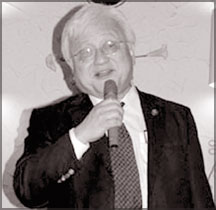
Mike Honda |
If there is no progress in Japan over the World War II "comfort
women" issue, it is possible Honda and his fellow U.S. lawmakers may
take fresh action, possibly by bringing another resolution to the
Congress, he said.
"I think there can be (that possibility), but it has to be based on
educating the public," said Honda, stressing that educating the Japanese
people about their history should be one of the main purposes of such
congressional action.
Honda, a Democrat from California, spearheaded a resolution passed by
the House of Representatives last year demanding that Japan formally
apologize for coercing women into wartime brothels. According to Honda,
Japan has not extended any official apology over the issue and has not
recognized in a straightforward fashion the responsibility of the
Japanese military.
"I would hope (Fukuda) will lead his party and the Diet to pass a
bill that would recognize what has happened" in history, Honda said.
The Japanese government has argued that it and various prime
ministers have repeatedly apologized over the sex slavery issue.
But many former conform women and their supporters say these
apologies have been superficial and not based on a sincere attitude
toward history.
"As prime minister of Japan, I . . . extend anew my most sincere
apologies and remorse to all the women who underwent immeasurable and
painful experiences and suffered incurable physical and psychological
wounds as comfort women," said Prime Minister Ryutaro Hashimoto in a
1996 letter to former comfort women.
Subsequent Prime Ministers Keizo Obuchi, Yoshiro Mori and Junichiro
Koizumi signed letters with the same text that were sent to former
comfort women.
"We must not evade the weight of the past, nor should we evade our
responsibilities for the future," the prime ministers said in the
letter.
Japantimes
Bhutto's son seeks media privacy
Benazir Bhutto's son, Bilawal, has urged the media to leave him
alone, a week after he was named joint leader of her opposition Pakistan
People's Party.
Bilawal Bhutto Zardari, 19, said he hoped his privacy would be
respected while he studied at Oxford University.
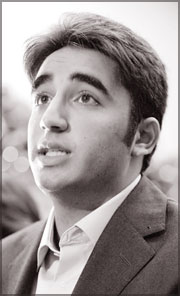
He told a news conference in London that his father would be in
charge of the party while he was a student.
The teenager was chosen to lead the party after his mother was
assassinated at an election rally late last month.
Bilawal Bhutto Zardari's comments came on the day Pakistan's national
and provincial elections should have been held.
The killing of Benazir Bhutto sparked days of nationwide unrest in
which more than 50 people were killed.
The vote has been postponed until 18 February.
The news conference in London was the first time the teenager had
addressed the world's media since being thrust into the spotlight a
little over a week ago.
Surrounded by party officials and aides, he said he had agreed to
take over from his mother because "politics is in my blood".
But he added: "My experience to date is limited... I intend to
learn." For the time being, his father Asif Ali Zardari would be in
charge of the Pakistan People's Party (PPP), Bilawal Bhutto Zardari
said.
He himself would step into his role only gradually, once his studies
were complete. Ms Bhutto's son grew up being called Bilawal Zardari, but
it was announced after her death that the couple's children would be
called Bhutto Zardari.
The teenager criticised the lengths some journalists had gone to in
tracking down his personal details, particularly on the social
networking site, Facebook.
"When I am at Oxford I hope I can be left alone."
He said his position as PPP chairman reflected the "collective will
of the party", and he denied repeated suggestions by journalists that
perpetuating the Bhutto "dynasty" conflicted with democracy.
"I do not claim to have any aspiration. I was called and I stepped up
to do what I was asked to do."
Bilawal Bhutto Zardari also said that had the Pakistan authorities
given his mother adequate protection she would still be alive today.
He welcomed the assistance of United Kingdom police in the
investigation into his mother's death, but reiterated a call for a
United Nations-sponsored inquiry.
"We do not believe that an investigation under the authority of the
Pakistani government has the necessary transparency," he said.
"Already so much forensic evidence has been destroyed."
Scotland Yard detectives met President Pervez Musharraf "to share
their initial findings" on Tuesday, government officials said.
BBC
World's biggest building, Crystal Island, to be constructed in
Moscow
The skyscraper, dubbed as the Crystal Island, is 449.88 meters high.
When completed, the building will look like a spiraling pyramid. The
foot of the pyramid will be 701 meters in diameter.
The Crystal Island has already earned the reputation of the most
ambitious building project in the world. The construction is evaluated
at four billion dollars.
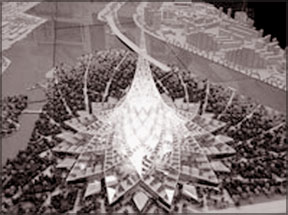
The city within the building will house 900 luxury apartments, 3,000
hotel rooms, a theater, a fitness complex, a cinema, a museum and an
international school for 500 students, not to mention countless stores.
The Crystal Island will be Lord Foster's second large-scale project
in Moscow, and his third building design that resembles a volcano. Many
people call the new building the Christmas tree of Moscow.
However, the project may put Russia at the forefront of a new wave of
city design. The Crystal Island will also symbolize Russia's powerful
economic rise.
Most likely, the skyscraper will be built about ten kilometers far
from Moscow's center. The project is set to be completed in 2014.
The exterior facade will be solar responsive and will include solar
panels. The panels, along with turbines, will generate electricity for
the huge building.
Pravda, Russia
Bhutto to blame for own death, says Musharraf
Former Pakistani Prime Minister Benazir Bhutto invited her own death,
President Pervez Musharraf said in an interview aired on US television
on Sunday.
"For standing up outside the car, I think it was she to blame
alone-nobody else. Responsibility is hers," Musharraf told CBS' 60
Minutes. Bhutto was killed on December 27 during a political rally in
Rawalpindi when she stood up through the sunroof of her car and a bomber
fired shots at her and blew himself up.
"If she had not come out of the vehicle, the protected and armoured
vehicle, maybe we would have seen her smiling face again today,"
Musharraf said.
Pakistan has launched an investigation into Bhutto's assassination
and has sent a team of five British experts to help in the probe.
Gulf News, UAE
Kenya leader names new ministers
Kenya's President Mwai Kibaki has named new ministers, just before
Ghana's leader arrived as part of mediation efforts following disputed
elections.
No-one from the main opposition party was appointed and members of
the party have said they will not recognise the new cabinet. A BBC
correspondent says the move could derail the efforts of Ghana's John
Kufuor, who heads the African Union.
|
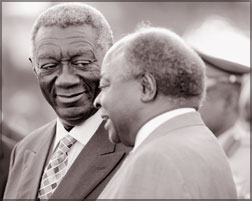
African Union Chairman and Ghana's president John Kufuor (L)
is welcomed by Kenya's President Mwai Kibaki (C) upon his
arrival at the airport in Nairobi. Kufuor arrived in Kenya
to mediate a solution to the crisis between President Mwai
Kibaki and his defeated presidential rival Raila Odinga, a
foreign ministry official told AFP. Kibaki had initially
rejected mediation by Kufuor but has since accepted the AU
Chairman's input to resolve the political impasse.
- AFP |
Violence broke out in opposition strongholds following the
announcement. Mr Kibaki gave the announcement in an address to the
nation, which he recorded before going to the airport to welcome Mr
Kufuor.
"In naming the cabinet, I have considered the importance of keeping
the country united, peaceful and prosperous and a strong broad-based
leadership," he said.
But the opposition rejected the cabinet. "It has absolutely no legal
standing, having been nominated by a president who himself is
illegitimately sworn in, into office, completely in violation of our
constitution," said Anyang Nyongo, secretary-general of the opposition
Orange Democratic Movement (ODM).
ODM leader Raila Odinga, who claims that fraud robbed him of victory,
says Mr Kibaki should step down and new polls be conducted.
Looting
In that context, the BBC's Adam Mynott in Nairobi says Mr Kibaki's
move, in naming some members of his new cabinet, could be seen as a
provocative act. Some 600 people have died in a wave of clashes across
Kenya after the opposition said the election had been rigged.
Residents of the western town of Kisumu say that three people have
died in the latest clashes but local police chief Grace Kahindi denied
this.
Kisumu on Lake Victoria is Mr Odinga's home town and was the scene of
serious fighting and violence last week, which left 100 people dead.
"The youth are unhappy with the announcement of the new cabinet,
which they term as provocation," local reporter Joe Ojuang told the BBC
News website.
There are reports that fires have been started and property looted,
while police have been firing over the heads of crowds of people on the
streets.
In nearby Eldoret, which witnessed the torching of a church last
week, people who had returned after five days violence have started
fleeing, boarding vehicles with their belongings.
The BBC's Wanyama wa Chebusiri in the town says they fear an imminent
attack by opposition supporters because of Mr Kibaki's cabinet
announcement and do not want to take any chances. Armed policemen in
riot gear have returned to the streets, he says.
Key posts
With Mr Kibaki naming only half of the cabinet, correspondents say
the implication is that other posts are being left open for the outcome
of negotiations.
However, they say it is the key ministries that have been filled,
leaving 15 remaining posts.
Mr Kibaki named Kalonzo Musyoka, who came third in last month's
election, as vice-president. The 17 cabinet members named include at
least one other member of Mr Musyoka's party, as well as Uhuru Kenyatta,
from the former ruling Kanu party.
Mr Musyoka's Orange Democratic Movement-Kenya split from Mr Odinga's
party last year in a row over who should represent the party.
While many former cabinet members lost their seats in the
parliamentary elections, Mr Kibaki has retained several close allies
from his Party of National Unity (PNU).
They include Energy Minister Kiraitu Murungi, who has previously been
sacked as a minister over a huge corruption scandal.
'Gentle giant'
Mr Kufuor's trip was seen as a sign that there has been some progress
on the meditation front as his visit last week had been blocked. The
BBC's West Africa correspondent Will Ross says Mr Kufuor is not someone
to bash heads together - he is known as the "gentle giant" - and has
helped negotiate during the conflicts in Ivory Coast and Liberia.
Both sides have accused the other of ethnic-cleansing during a week
of violence after Mr Kibaki was declared the winner.
Some 250,000 people have fled their homes in clashes between rival
political supporters, ethnic groups and the police.
BBC
Abbas and Olmert agree on talks
Israeli and Palestinian leaders have agreed to negotiate on the core
issues dividing them, as US President George W Bush embarks on a tour of
the region.
Palestinian leader Mahmoud Abbas and Israeli PM Ehud Olmert
authorised talks on issues such as Israeli settlements and the borders
of a Palestinian state.
|
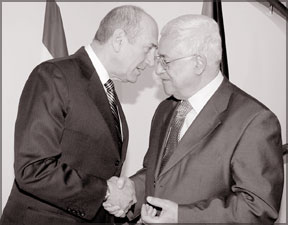
Ehud Olmert (L) and Mahmoud Abbas |
The two leaders vowed at a US summit last year to try to achieve a
two-state solution by the end of 2008. Mr Bush hopes to kick-start the
process when he arrives on Wednesday.
The status of Jerusalem and the question of Palestinian refugees are
also key issues dividing the two sides. Mr Bush left Andrews Air Force
base on Tuesday evening and is due to arrive in Tel Aviv at 1200 (1000
GMT) on Wednesday.
He has said there will be three main themes to his first visit as US
president to the region.
He said Palestinians need to have a clearly defined vision of a state
that can exist alongside Israel, and both Palestinians and Israelis need
to fulfil their obligations to bring about this vision.
He also repeated that the US was committed to security in the region.
But correspondents say many Israelis and Palestinians are sceptical
about the chances for progress.
'Year to reach peace'
Officials say the leaders' talks in Jerusalem were intended to keep
up the momentum achieved at the peace conference in Annapolis, Maryland,
in November.
Chief Palestinian negotiator Saeb Erekat said it had been agreed that
Israeli Foreign Minister Tzipi Livni and former Palestinian Prime
Minister Ahmed Qurei, also known as Abu Ala, would "start intensive
meetings to immediately discuss all core issues of a final status
agreement."
"The president [Abbas] urged that the year of 2008 be made the year
to reach peace. The intention is to see to it that we give peace a
chance," Mr Erekat said.
But the BBC's Bethany Bell in Jerusalem says the rows over Israeli
settlement construction in occupied East Jerusalem and of militant
rocket fire into Israeli territory have not gone away.
Mr Olmert has expressed particular concern at one rocket attack that
reached as far as the Israeli town of Ashkelon, 15km (nine miles) from
the border.
For their part, the Palestinians are angry that Israel wants to build
more than 300 new apartments in a disputed part of Jerusalem.
Abbas spokesman Nabil Abu Rudeina said: "We are expecting that
President Bush will get Israel to freeze settlement activity."
Tougher questions remain
The Palestinians have also accused Israel of stepping up raids in the
occupied territories ahead of Mr Bush's visit.
A further issue is the removal of Israeli outposts in the West Bank.
Beyond that even tougher questions remain - the Palestinians made
refugees since Israel's creation in 1948 and the sovereignty of
Jerusalem.
Mr Abbas also faces the problem of Gaza - under the control of
militant group Hamas since his Fatah faction was thrown out last summer.
Militant rocket fire continues into Israel from Gaza, sparking
Israeli military responses.
The two leaders have had regular meetings for several months but
little post-Maryland progress has been reported.
BBC
Sarkozy 'serious' about ex-model
French President Nicolas Sarkozy has said his relationship with
former supermodel Carla Bruni is "serious" but refused to reveal any
wedding plans.
He told reporters there was a "strong chance" the media would only
learn about the wedding after the event. The whirlwind romance between
the two has been making headlines in France and Ms Bruni's native Italy
for weeks.
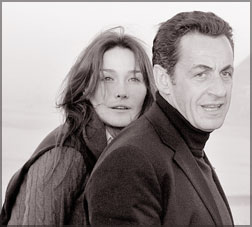 Mr Sarkozy, 52, and his wife Cecilia announced their divorce in
October, after being married for 11 years. His popularity has fallen by
several points according to several opinion polls since the New Year, a
decline attributed by many to the over-exposure of his private life. Mr Sarkozy, 52, and his wife Cecilia announced their divorce in
October, after being married for 11 years. His popularity has fallen by
several points according to several opinion polls since the New Year, a
decline attributed by many to the over-exposure of his private life.
Many French people increasingly see his romance with Ms Bruni as
impulsive, flashy, vulgar and, most importantly, distracting from his
work as president, the BBC's Emma Jane Kirby reports from Paris. But at
a press conference in Paris, Mr Sarkozy also defended his political
record since becoming president in May, commenting on everything from
the need for French economic reform to his relations with Russian
President Vladimir Putin.
The French leader said he and his girlfriend wished to "break with a
hateful tradition of hypocrisy" by making their relationship public.
"Carla and I have decided not to lie," he said, in what the French news
agency AFP reports was a clear allusion to the late President Francois
Mitterrand's concealment of an illegitimate daughter for years.
Mr Sarkozy has three children, two from his first marriage to
Marie-Dominique Culioli, and the third by Cecilia. Ms Bruni, 39, has a
young son from a previous relationship with philosopher Raphael Enthoven.
At various times, she was also linked to men including Mick Jagger,
Donald Trump and Eric Clapton. She has made a successful career as a
singer since her modelling days.
France was in need of change, Mr Sarkozy said, after "decades of
reforms being put off, of failed reforms". Two Nobel economists, Amartya
Sen of India and Joseph Stiglitz of the US, would be working on changes
in the way French economic growth is calculated to include
quality-of-life factors, he announced.
People, he added, "can no longer accept the growing gap between
statistics that show continuing progress [in growth] and the increasing
difficulties they are having in their daily lives". Accepting that "the
international situation is less good than you could have hoped for", Mr
Sarkozy insisted France's own economic strategy would not change.
On employment and education, he called for greater use of positive
discrimination, saying there was "not enough diversity" in France, and
called for creating universities "where people want to study".
Advertising on public television should be scrapped, he argued, and
the shortfall funded by a levy on private TV channels. On international
affairs, the French president defended sending congratulations to his
Russian counterpart after the parliamentary election in December, saying
it did not affect his ability to criticise him on such things as human
rights and Chechnya.
"I prefer to congratulate Putin, while asking him: 'Why did you do
that? But bravo all the same for being elected'," he said.
BBC |
